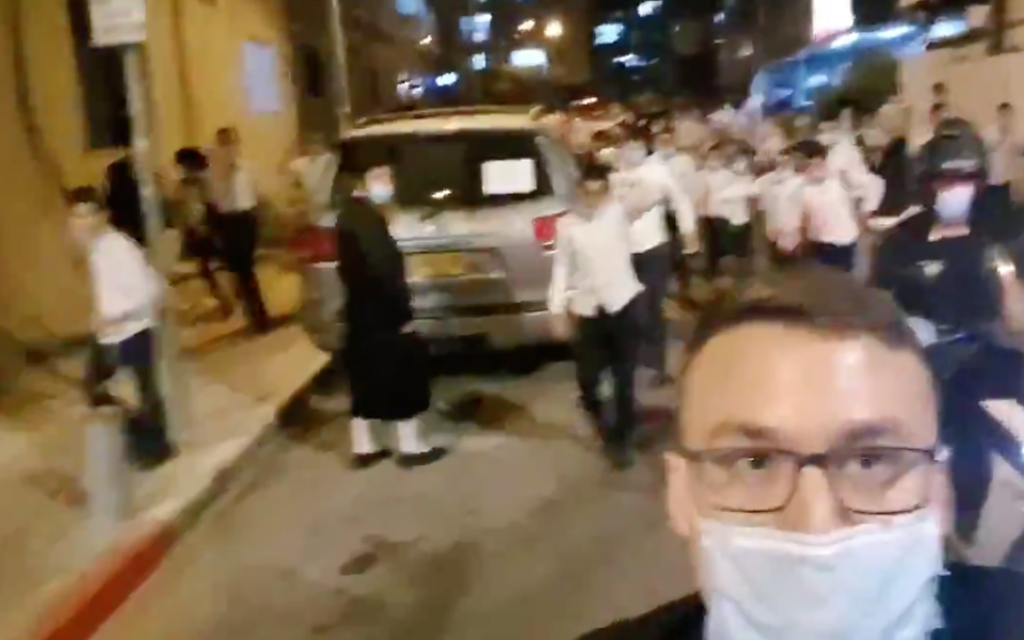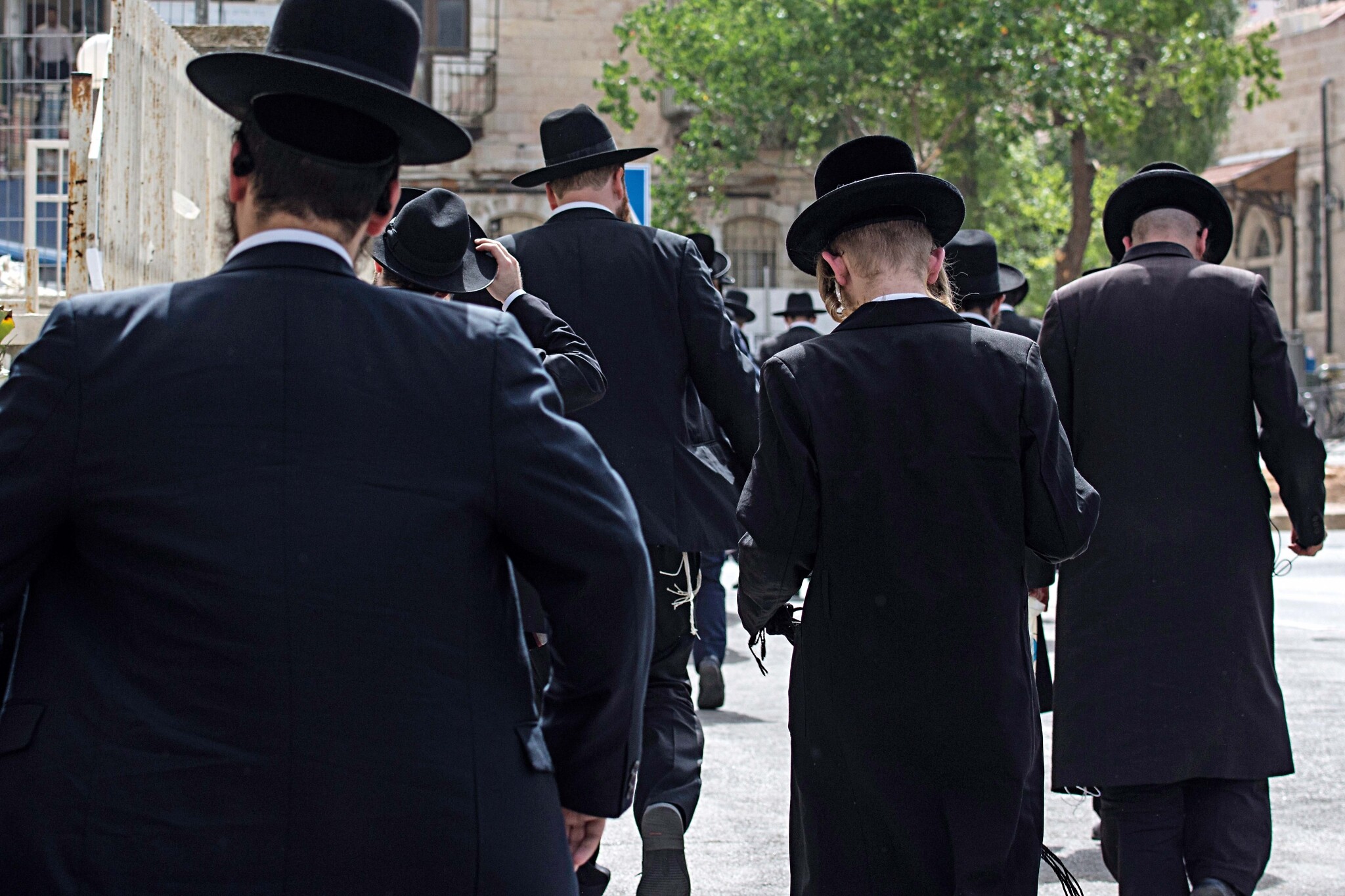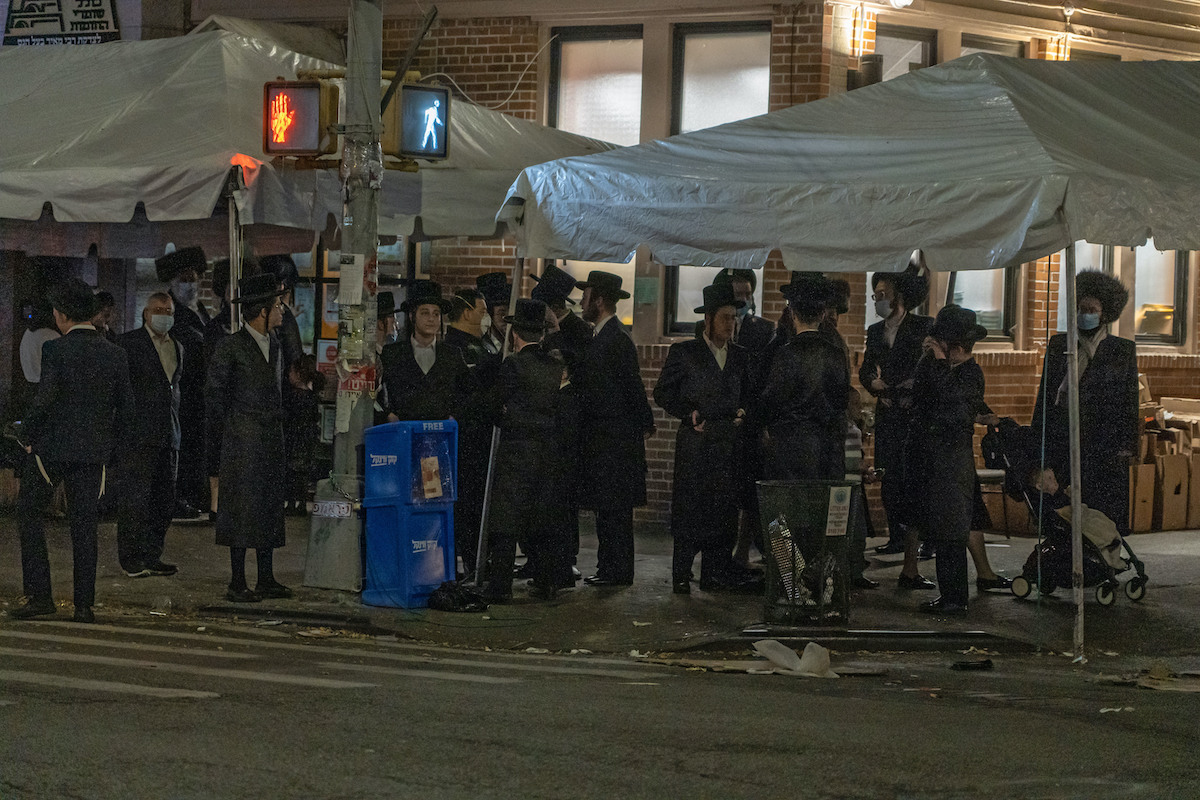Journalists report being attacked while covering Charedim during Covid-19
'Dozens crowded around me, throwing eggs, knocking on [my car] windows and shouting insults', Channel 12 correspondent Carmel Libman said

As a journalist in Israel, Marc Israel Sellem has dodged shellfire and run through riots while working. But the Jerusalem Post photographer was still surprised by what happened Sunday when he set out to document the reopening of Charedi schools in violation of government restrictions aimed at curbing the spread of COVID-19.
As he began snapping pictures in Jerusalem’s Mekor Baruch neighbourhood, passersby began screaming at him, accusing him of not caring about their community. As the confrontation escalated, one man grabbed at Sellem’s camera before punching him in the shoulder.
Scared of what would happen if the clash were to continue, Sellem hightailed it back to the Post’s nearby newsroom.
Get The Jewish News Daily Edition by email and never miss our top stories Free Sign Up
“I’m not a coward,” the veteran reporter told the Jewish Telegraphic Agency. “I’ve done stuff that’s dangerous, but people come and yell ‘you gentile, take off your kippah’… gevalt!”
Around the same time, in the Charedi West Bank settlement of Beitar Illit, Channel 12 correspondent Carmel Libman found himself under attack by angry residents as he covered a similar story.
“Dozens crowded around me, throwing eggs, knocking on [my car] windows and shouting insults,” he tweeted. “When I managed to leave the Talmud Torah [Orthodox grade school] where the gathering took place and parked a few blocks away, the crowd came and surrounded me again.”
Sellem and Libman are not alone. Other Israeli reporters had similar encounters in the previous days, as members of Israel’s Charedi minority increasingly blame the media for their ills, including the stringent lockdown conditions imposed on their towns and neighbourhoods. According to a joint Israel Democracy Institute-World Zionist organisation poll released this week, more than four out of five Charedi Israelis view their community as a target of hate, with 75% blaming the media.
Israel imposed a national lockdown in mid-September, as the country’s per-capita coronavirus infection rate became the worst in the world. As the country began to ease those restrictions this week, it initially left the lockdown rules in place in a number of heavily Charedi areas, where infection rates remain higher. According to Israeli health officials, Charedi communities have accounted for at least 34% of all cases despite comprising just 12% of the total population.

The dynamics in those areas have mirrored those of Charedi communities in the United States during the pandemic. With high population density and communal prayer and learning playing a central role, distancing is less practicable. Mask wearing has also been less consistent in Israel’s Charedi enclaves, and rules including school closures have sometimes been flouted.
Just as in the United States, Charedi critics of Israel’s lockdown have claimed that the rules were applied unevenly, pointing to mass anti-government protests and asking why they could not keep their synagogues open if other large-scale activities were permitted. (Large protests were briefly banned during the lockdown, too.) During the High Holidays, clashes took place between Charedi Jews and law enforcement officers tasked with shutting down mass gatherings.
One of those perceived threats is negative press coverage, which some Charedi Israelis engage in violence to prevent, said Gilad Malach, a researcher at the Israel Democracy Institute who studies Israel’s Charedi Jews. For those engaging in violence, it is “not the behaviour but the coverage” that is the root of the problem, he said.
According to Rabbi Shmuel Pappenheim, a former spokesman for Eda Haredit, a rabbinic organisation representing a right-wing faction of the Charedi community, the real difficulties the pandemic has posed in maintaining the highly structured lifestyle typical in Charedi communities has led to outrage at anything perceived as a threat to traditional practices.
When full-time yeshiva studies are suspended, Charedi children “ask questions and behave in ways that are very frustrating to the parents,” he said, adding that, “the ultra-Orthodox leadership has no solution to this situation” and feel that they are “not understood.”

(Photo by Ron Adar / SOPA Images/Sipa USA)
In the face of such a challenge, when many members of the Charedi community have little access to “the leadership, the politicians, the decision-makers,” he said, they vent their rage at the press.
“The Charedi community (to the extent that it can be talked about as a singular entity) is spinning this as persecution and singling them out,” said Yoel Finkelman, curator of the Judaica Collection at the National Library of Israel and the author of a book about Charedi media.
The Charedi are “very concerned about bad publicity” and, as such, the current situation has created “the perfect conditions for violence against journalists,” he agreed.
A similar situation has played out in Hasidic communities in the United States. Earlier this month, Jacob Kornbluh, a reporter and member of the Hasidic community in Brooklyn’s Borough Park, was assaulted during a protest and subjected to a campaign of intimidation for his reporting on the pandemic.
Kornbluh said he expects the attacks to continue “as long as community leaders and rabbis don’t come out and say explicitly that any violence, especially against a member of the press, is unacceptable.”
There is a lot of “anger and frustration in these communities,” Kornbluh said. “And they are letting it out [at] anyone coming close to them — law enforcement, city officials or members of the media.”
The current spate of attacks in Israel began during the festival of Sukkot on Oct. 4, when Channel 13 reporter Yossi Eli was attacked by a mob in Jerusalem’s Mea Shearim neighbourhood. Taking refuge in his car, he recorded his attackers punching and kicking the windows, one of which was eventually shattered by a rock.
העיתונאי יוסי אלי וצוותו הותקפו סמוך לכיכר השבת@Yossi_eli pic.twitter.com/1IplYyBc7m
— לירן תמרי | Liran Tamari (@liran__tamari) October 4, 2020
That same day, Jerusalem Post religious affairs correspondent Jeremy Sharon was assaulted while documenting hundreds of members of the Belz Hasidic sect entering a building for a mass gathering in honour of the holiday.
“Someone tried to grab my phone and another just came up to me and started punching me,” he recalled, describing how he was then chased for about 100 meters before escaping.
Like Sellem, Sharon believes that anger among Charedi Israelis is driven in large part by the perception, shared by many across the religious and political spectrum, that the government’s rules have been inconsistent and capricious.
While many Charedi Israelis are not actively hostile to the press, the community’s extreme fringes are currently “concerned that what they are doing will be exposed and will create problems with the police,” he said.
One guy started hitting me, another tried to grab my phone, another two tried were running after me and two tried to block me leaving the drive way. https://t.co/P1Snq7xdSL
— Jeremy Sharon (@jeremysharon) October 4, 2020
On Oct. 7, three days after Sharon was attacked, Army Radio reporter Shahar Glick also ran into trouble covering an event held by the Belz Hasidic sect. After rebuffing a man’s suggestion that he leave the area, he was jumped by several men who beat him, stole his phone and forced him into an alley. Telling Glick that he was taking his life into his hands by covering their community, they photographed his identity card and informed him that they now knew where he lived.
There were three other incidents that day. In Bnei Brak, Israel, reporter Ittai Shickman films himself chased by a mob of Charedi Jews while standing outside the home of a prominent rabbi. (Screen shot from Twitter)In Jerusalem, a glass bottle was thrown at Mynet reporter Liran Tamari. And in Beit Shemesh, i24 reporter Pierre Klochendler was verbally harassed by angry locals who stole some of his equipment.
As he left the neighbourhood under a police escort, “kids threw stones on the windscreen and tore off one of the antennas.”
One person was detained in connection with the attack on Glick, but there have been no other arrests reported in connection with the other incidents.
ושוב תוקפים עיתונאים בבני ברק. ושוב אין שוטר אחד בסביבה. ושוב התחושה שיש חלק במגזר החרדי שחושב שלתקוף עיתונאים זה לגיטימי. ואתם יודעים מה הכי עצוב פה? שבאנו לדווח על שמחה – שמחת בית השואבה והשמחה שחסידי הרב קנייבסקי זכו לראות אותו היום מהחלון לראשונה מאז נדבק בקורונה. זה לא קרה pic.twitter.com/BNa7KBf1yZ
— Ittai Gad Shickman | איתי שיקמן (@ittaishick) October 7, 2020
WATCH! i24NEWS' correspondent Pierre Klochendler and cameraman approached a group of ultra-Orthodox, offering them the opportunity to talk.
In response, the group harassed and kicked them, shouting: 'Go Home! Move from here !' pic.twitter.com/7Ce4NsQ2Vp— i24NEWS English (@i24NEWS_EN) October 7, 2020
For Sellem and other journalists who have found themselves in his position, tensions over media coverage of Charedi communities seem likely to stretch on as long as the coronavirus crisis does.
“They think they have problems because of what’s in the media but the real enemy is corona, not the government or the press,” Sellem said.

Thank you for helping to make Jewish News the leading source of news and opinion for the UK Jewish community. Today we're asking for your invaluable help to continue putting our community first in everything we do.
For as little as £5 a month you can help sustain the vital work we do in celebrating and standing up for Jewish life in Britain.
Jewish News holds our community together and keeps us connected. Like a synagogue, it’s where people turn to feel part of something bigger. It also proudly shows the rest of Britain the vibrancy and rich culture of modern Jewish life.
You can make a quick and easy one-off or monthly contribution of £5, £10, £20 or any other sum you’re comfortable with.
100% of your donation will help us continue celebrating our community, in all its dynamic diversity...
Engaging
Being a community platform means so much more than producing a newspaper and website. One of our proudest roles is media partnering with our invaluable charities to amplify the outstanding work they do to help us all.
Celebrating
There’s no shortage of oys in the world but Jewish News takes every opportunity to celebrate the joys too, through projects like Night of Heroes, 40 Under 40 and other compelling countdowns that make the community kvell with pride.
Pioneering
In the first collaboration between media outlets from different faiths, Jewish News worked with British Muslim TV and Church Times to produce a list of young activists leading the way on interfaith understanding.
Campaigning
Royal Mail issued a stamp honouring Holocaust hero Sir Nicholas Winton after a Jewish News campaign attracted more than 100,000 backers. Jewish Newsalso produces special editions of the paper highlighting pressing issues including mental health and Holocaust remembrance.
Easy access
In an age when news is readily accessible, Jewish News provides high-quality content free online and offline, removing any financial barriers to connecting people.
Voice of our community to wider society
The Jewish News team regularly appears on TV, radio and on the pages of the national press to comment on stories about the Jewish community. Easy access to the paper on the streets of London also means Jewish News provides an invaluable window into the community for the country at large.
We hope you agree all this is worth preserving.
-
By Brigit Grant
-
By Laurent Vaughan - Senior Associate (Bishop & Sewell Solicitors)
-
By Laurent Vaughan - Senior Associate (Bishop & Sewell Solicitors)
-
By Laurent Vaughan - Senior Associate (Bishop & Sewell Solicitors)
-
By Laurent Vaughan - Senior Associate (Bishop & Sewell Solicitors)





















